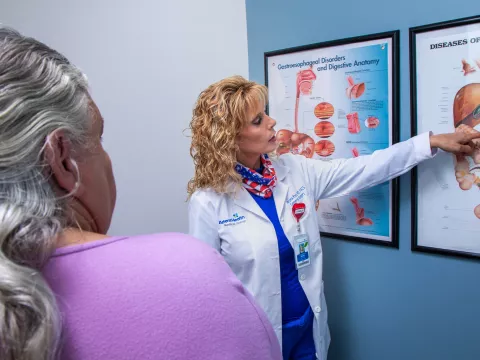- AdventHealth

Two interventional cardiologists at the AdventHealth Pepin Heart Institute have become the first at AdventHealth Tampa to complete a high-risk minimally invasive heart procedure through an artery near the patient’s shoulder. Oliver G. Abela, MD, FACC, and James Smith, MD, performed the procedure, which usually requires doctors to make an arterial puncture in a patient’s groin to reach the main leg (femoral) artery. However often a patient’s artery is too narrowed by plaque deposits to make this approach possible. In other cases, patients are unable to lie flat because of severe spinal problems. Not lying flat during the procedure can lead to severe bleeding from the puncture site, so the usual approach would not be an option.
Often, this set of circumstances would require a patient to have open heart surgery, but the patient was too high risk for surgery. Instead, catheter-based heart artery intervention posed a lower risk and was better suited for this patient.
“Because the patient wasn’t a candidate for open heart surgery nor percutaneous intervention the way we usually offer it, we had to try a new approach,” says Dr. Abela. He and Dr. Smith accessed the heart through the axillary artery near the shoulder. “This is a fairly new technique that’s only received national attention in the past two years or so,” Dr. Abela continues. After making an arterial puncture in the upper arm, the doctors guided a heart pump and other instruments through the arteries and to the heart to complete the procedure.
Dr. Abela calls the new approach used at AdventHealth Tampa a “lifesaving procedure” that gave the patient a much-needed treatment option he otherwise would not have had.
The Development of PCI, or Angioplasty and Stenting
In the not-too-distant past, people who needed a to have their coronary arteries unblocked always required open heart surgery. This approach, called coronary artery bypass surgery (CABG), involves a large operation where a patient’s ribcage is opened up so a cardiac surgeon can reach the heart. This is still the ideal treatment option for some patients.
However, today, many heart procedures can be performed in cardiac catheterization labs – “cath labs” – by specialists such as Dr. Abela and Dr. Smith known as interventional cardiologists. As an alternative to open heart surgery, doctors insert a thin flexible tube called a catheter into the femoral artery, radial artery in the wrist or one of the other large blood vessels. This catheter is threaded up through the vessels and into the heart. There, a thin balloon on the end of the catheter is inflated to widen the artery previously blocked by plaque mostly made of cholesterol. Very often the interventional cardiologist will also insert a stent, a mesh tube that supports the artery so that it stays open.
This procedure is called percutaneous intervention, or PCI. Percutaneous is a term that comes from the Latin per cutem, meaning “through the skin.” The doctor makes a small hole in the skin and performs the procedure – the intervention – through it. The benefits of this approach for the patient are enormous.
“We’re talking about poking versus cutting, needles versus blades,” says Dr. Abela of PCI. Because patients only have one small puncture in the skin instead of a large cut in the chest, they recover much more quickly after their heart procedure. They also tend to have less pain after the procedure and a lower chance for complications such as blood loss and infection.
What This New PCI Approach Means for People in the Tampa Bay Region
In the case of the patient that Dr. Abela and Dr. Smith treated, a device called an Impella® was required to help the heart pump the patient’s blood during the procedure. The Impella is small and designed for use during high-risk PCI procedures where the patient has severe disease or might otherwise face complications. However, the Impella requires a large opening in the blood vessel it is inserted into prior to being guided into the heart.
Unfortunately, many patients with heart disease have narrowed arteries elsewhere in their bodies – a condition called atherosclerosis. The same atherosclerosis that causes plaque deposits to close off arteries in the heart can lead to deposits in the arteries in the legs that do the same thing. In the heart, it’s called CAD, or coronary artery disease. In the legs, it’s PAD, or peripheral arterial disease. Patients with PAD can have PCI procedures as long as their arteries are wide enough for the instruments to fit through. However, often the Impella pump requires a much larger opening than the patient has in the artery of the upper leg. Other times, patients are unable to lie flat because of spinal issues, making the upper leg site not an option.
Until very recently, many patients with CAD and PAD had no other options besides open heart surgery when they needed lifesaving intervention. However, now the Pepin Heart Institute has experience in using an alternative PCI access point in the upper arm. This expertise gives our patients yet another option so doctors can offer improved ways of treatment.



